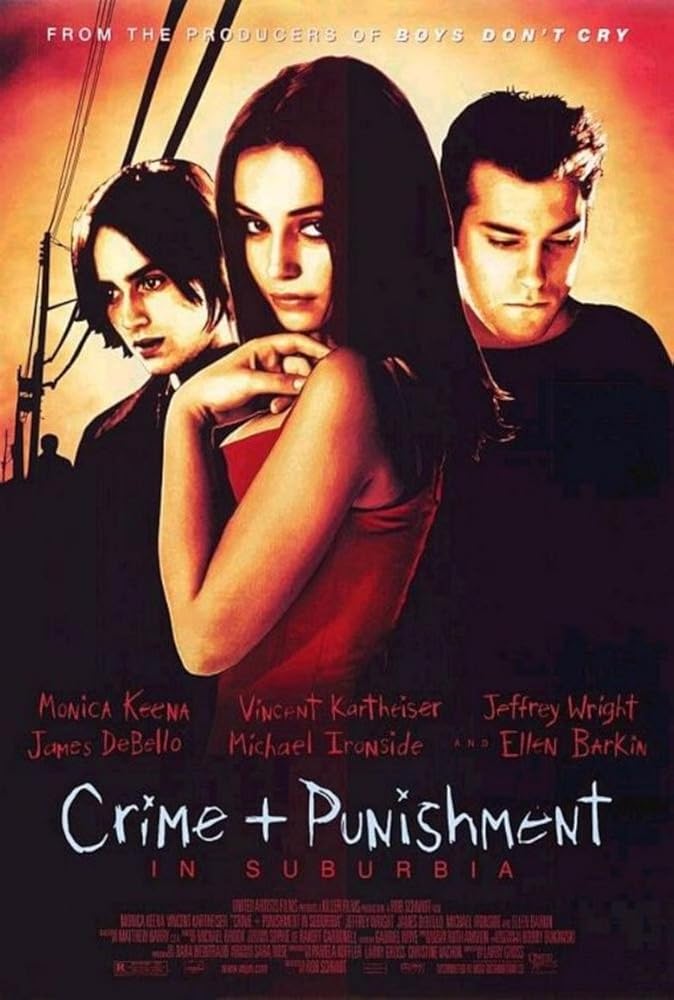
CRIME & PUNISHMENT IN SUBURBIA
(director: Rob Schmidt; screenwriter: Larry Gross/inspired by Dostoyevsky’s “Crime and Punishment”; cinematographer: Bobby Bukowski; editor: Gabriel Wrye; cast: Michael Ironside (Fred Skolnik), Ellen Barkin (Maggie Skolnik), Monica Keena (Roseanne Skolnik), Blake Shields (Moznick), Vincent Kartheiser (Vincent), James DeBello (Jimmy), Jeffrey Wright (Chris), Conchata Ferrell (Bella), Marshall R. Teague (Football Coach); Runtime: 100; United Artists; 2000)
“This is one twisted pic.”
Reviewed by Dennis Schwartz
There’s not one character in this film that I felt anything for. The film foolhardily evokes Dostoyevsky’s “Crime and Punishment” as the inspiration behind this contemporary teen-age angst tale, yet the only thing that reminds me of the Russian’s novel is part of the film’s title.
It’s a disturbing film about a fucked-up domestic situation in the West Coast suburbs. It’s a story about an alienated teenager who uses violence to get what she wants, as all the characters she’s in contact with are also dysfunctional.
In Dostoyevsky, Raskolnikov murdered an innocent old woman to test his theories that superior human beings can act free of man-made rules. In this film, a sexy cheerleader suffering from an unhappy home life, Roseanne Skolnik (Keena), decides to kill her drunk, self-pitying, stepfather, Fred (Ironside), after he molests her. This unpleasant script by Larry Gross is vacuous and has no grip on what the Russian author was trying to say.
The others in this domestic dispute are the embittered Ellen Barkin as Maggie, an unhappy wife, married to a wealthy man she’s not attracted to. She meets a black man who is a bartender (Jeffrey Wright) and flaunts the relationship in front of her husband, and since she found her husband’s dead body and has the motive for killing him and all the circumstantial evidence points to her — she becomes the innocent one who goes to trial accused of the murder. The black man is falsely called her pimp, as some kind of racial inference is made about their mixed racial relationship.
Perhaps the most unsatisfying character was the antihero, high school student Vincent (Vincent Kartheiser), the alienated loner freak who can’t fit in and follows Roseanne around taking pictures of her wherever she goes. Vincent’s got some kind of sexual hangup on her and to prove his hipness, he tattoos the words “por nada” on his arm. Vincent also does the voiceover to explain his motivations for following her, saying he wants to save her from hell. The more he spoke, the stupider he sounded.
Roseanne’s dull, bully, stud football jock, Jimmy (DeBello), helps her on her request to kill Fred by holding him down while she sticks him with a paring knife and when that doesn’t get the job done she uses her mother’s electrical carving knife–the one mom used in the opening scene for the family roast. When Jimmy no longer serves her needs, she leaves the poor sexually frustrated chump hanging and goes to Vincent for support. Vincent gives her cliché Oprah like self-help advice. Believe it or not, even without having sex with him, Roseanne proclaims in jail after she confesses to the crime: “What a strange path it took to find my heart.” When she said that, it came out of the blue and made absolutely no sense. I don’t know what she found, but if she calls what she found love–then she lost me.
This is one twisted pic. Made all the worst because it’s not in good taste. But the subject matter here is ripe for a Ray Steckler flick. It’s a shame the film wasted so much good photography techniques and good background music and some good acting improvisations on such an empty story.
This film was released a year after the similar “American Beauty,” even though it was made earlier. It therefore also suffers from being thought of as a copy of that film, even though it wasn’t.
REVIEWED ON 9/9/2001 GRADE: C –